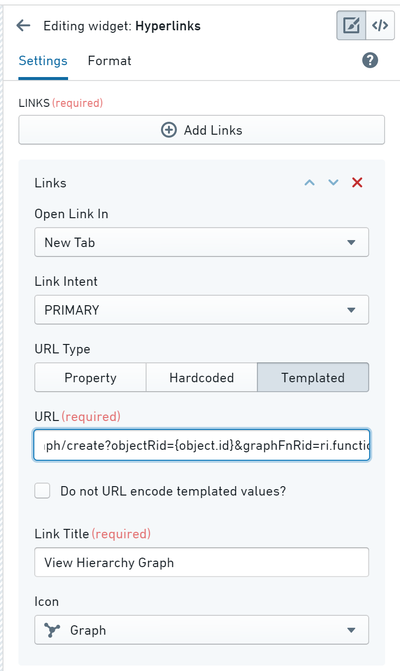- Capabilities
- Getting started
- Architecture center
- Platform updates
Generate a graph from other applications
You can configure a link within other Foundry applications that will automatically generate a pre-populated Vertex graph.
Using URL parameters to generate a graph
You can use URL parameters to perform the following actions:
- Start with an existing graph or create a new graph.
- Add objects to the graph by specifying an object ID or object set ID.
- Running a Search Around function.
- Setting the time range of the time selector.
These parameters apply only to the URL that creates new graphs (/workspace/vertex/graph/create):
selectObjectRid: Selects and centers the graph on the specified object, if it is present.objectRid: Adds the specified object as a node to the graph.objectSetRid: Adds all objects in the specified object set as nodes to the graph.searchAroundFnRid: Adds to the graph the result of the specified Search Around function. The function will be called with either a single object if used with theobjectRidparameter, or all the objects from theobjectSetRidobject set.- Must be used in conjunction with either the
objectSetRidor theobjectRidURL parameter.
- Must be used in conjunction with either the
The following parameters apply to URLs both for existing graphs (/workspace/vertex/graph/{graphRid}) and newly-created ones (/workspace/vertex/graph/create):
selectedTime: Sets the selected time.startTime: Sets the start time for a time range.endTime: Sets the end time for a time range.
All times can be either UNIX timestamps in milliseconds or ISO-formatted dates/datetimes (e.g. 2020-02-15/2020-02-15 13:45:00 UTC). If selectedTime is specified but at least one of startTime and endTime is not, the time range will have the default duration and be centered around the selected time. If startTime and endTime are specified but selectedTime is not, the selected time will be the same as startTime.
Generate a Vertex graph from other applications
Once you set your URL parameter, you can use this link to generate the pre-configured graph from other applications. For example, using the Hyperlinks Widget in Object Explorer:
